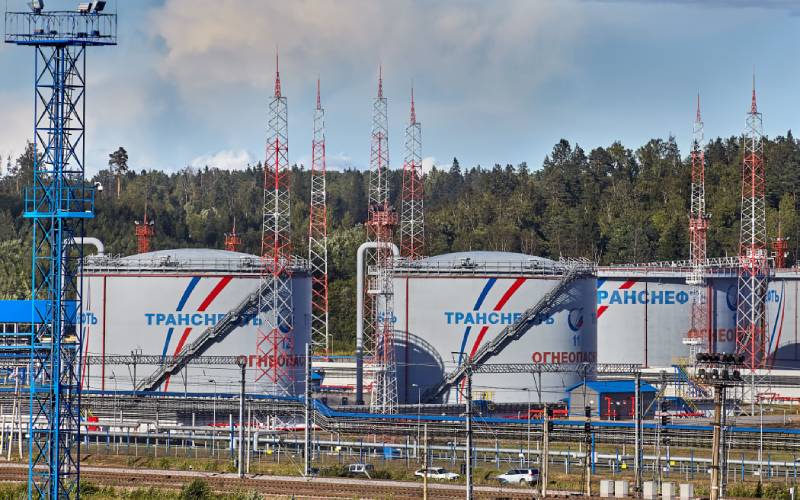World
New price caps on Russian petroleum products are announced by the US, European Union, G7, and Australia

After imposing a price cap on Russian oil prices last year, the United States and the G7 are imposing two more price caps on Russian refined petroleum products. A senior Treasury official made the announcement on Friday, adding to sanctions on Russian energy sales in response to the country’s invasion of Ukraine, that the United States and its allies are attempting to further limit Russia’s ability to make money and finance its war efforts by imposing new price limits on products like gasoline and fuel oil.
Officials agreed to set prices for petroleum products at two different levels. According to the US Department of Treasury, the agreement between the United States, the G7, the European Union, and Australia places a price cap on “seaborne Russian-origin petroleum products.” There are two levels of cost: One applies to “discount-to-crude” petroleum products like fuel oil, which will be limited to $45 per barrel, and the other to “premium-to-crude” petroleum products like diesel, kerosene, and gasoline, which will be limited to $100 per barrel.
The first cap, which will be set at $100 per barrel, will be applied to “premium-to-crude” petroleum products like gasoline, diesel, and kerosene. The other will be applied to fuel oil and other “discount-to-crude” petroleum products at a price of $45 per barrel.
Sunday, February 5, or shortly thereafter, these price caps take effect.
In a statement, Treasury Secretary Janet Yellen stated, “The caps we have just set will now serve a critical role in our global coalition’s work to degrade Russia’s ability to prosecute its illegal war.”
“Combined with our historic sanctions, we are forcing Putin to choose between funding his brutal war or propping up his struggling economy.”
The agreement that was reached on Friday builds on the price cap that officials in Russia placed on crude oil exports in December. It aims to limit Russia’s primary source of revenue and promote stable energy markets worldwide.
Senior Russian officials have acknowledged that the crude oil price cap is reducing their revenue and has adversely affected Russia’s fiscal outlook, and Yellen stated that the United States sees early progress on the Russian oil price cap.
“Global energy markets have also remained well-supplied, and public reports indicate that crude oil importers are using the price cap to drive steep bargains on Russian oil imports,” said Yellen.
A Treasury official stated that the same group imposed a price cap on crude oil in December, which was already hindering Russia’s ability to finance the war. They went on to say that Russia had “openly acknowledged” that the price cap was hurting its economy. According to Russia’s data, monthly tax revenues from energy sales decreased by 46% from the previous month.
Reports that Russia’s economy is still expected to rebound despite numerous sanctions and may even outpace Germany and Great Britain were dismissed by officials. Economically, the nation “doesn’t function any longer like a normal economy,” according to a senior Treasury official.
“They’ve shut it down largely, meaning that if you have money from Russia, they’ll let you keep putting money in Russia, but you can’t take money out. They no longer allow foreign capital coming into Russia,” the official said. “They’re needing to spend more money to prop up their economy because they become a closed economy.”
According to the official, Russia’s budget deficit is increasing “because the war is costing them more money” as a result of the “bravery of the Ukrainian people” and “weapons.”
In order to ensure that the price cap on crude oil continues to achieve its objectives, the price cap coalition, which includes Australia, the G7, and the United States, will conduct a review of it in March. The outlook for the global economy and technical analysis will be taken into account in that review.
On Friday, crude oil prices decreased, with WTI crude oil falling more than 3.5 percent to $73.19 per barrel. This year, crude oil has been volatile, with WTI reaching $82 a barrel late last month.
-

 Sports4 weeks ago
Sports4 weeks agoFIFA Club World Cup 2025: Complete List of Qualified Teams and Groups
-

 Sports3 weeks ago
Sports3 weeks agoAl Ahly vs Inter Miami, 2025 FIFA Club World Cup – Preview, Prediction, Predicted Lineups and How to Watch
-
Health1 week ago
Back to Roots: Ayurveda Offers Natural Cure for Common Hair Woes
-

 Tech2 weeks ago
Tech2 weeks agoFrom Soil to Silicon: The Rise of Agriculture AI and Drone Innovations in 2025
-

 Sports3 weeks ago
Sports3 weeks agoFIVB Men’s Volleyball Nations League 2025: Full Schedule, Fixtures, Format, Teams, Pools and How to Watch
-

 Startup3 weeks ago
Startup3 weeks agoHow Instagram Is Driving Global Social Media Marketing Trends
-

 Television4 weeks ago
Television4 weeks agoTribeca Festival 2025: Date, Time, Lineups, Performances, Tickets and How to Watch
-

 Sports3 weeks ago
Sports3 weeks agoWorld Judo Championships 2025: Full Schedule, Date, Time, Key Athletes and How to Watch























